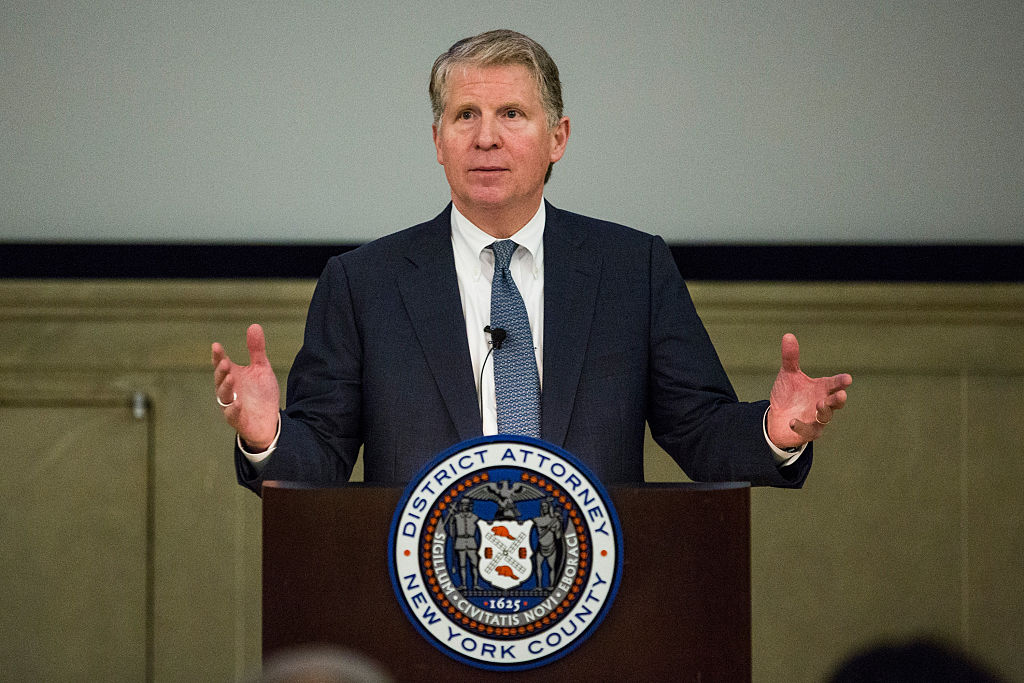Lawsuit: Manhattan D.A.’s Office Tracks Cops With ‘Credibility’ Problems, But Refuses To Release Its List
The office has criticized the NYPD for shielding officers’ misconduct histories, but it won’t share its own information on police dishonesty.

In July, the Manhattan district attorney’s office blasted the New York City Police Department over its refusal to share information on officers’ misconduct records with prosecutors pretrial. The office argued such information—which speaks to the credibility of police officers—is critical for prosecutors seeking to vet their witnesses and decide whether and how to charge a case.
But a new court petition, filed Monday, presents evidence that the Manhattan DA’s office keeps its own internal records on police officers with questionable credibility, and is refusing to disclose this information to defense attorneys and the public at large.
Access to such information could prevent wrongful incarceration, defense attorneys argue, because plea deals—how 97 percent of felony cases that result in convictions are settled in New York City—often turn on police officer testimony. Although prosecutors are technically required to disclose exculpatory material about officers that could help the defense under the Supreme Court decision Brady v. Maryland, defense attorneys argue these disclosures are seldom exhaustive and can be legally submitted weeks before trial starts, long after plea negotiations may have ended.
“The release of these names would impact the plea bargaining process in significant ways,” said Bennett Gershman, a Pace University law professor and former Manhattan prosecutor.
“Right now it’s a crapshoot for defense attorneys. They don’t know what a prosecutor has.”
The petition, filed by Andrew Stengel, a defense attorney and former Manhattan prosecutor, requests the DA’s office turn over a list he asserts it has of police officers with any indication of “adverse credibility findings” since Jan. 1, 2017. As evidence of the list’s existence, he points to a February 2018 trial for one of his clients during which the Manhattan DA’s deputy bureau chief, Jeffrey Levinson, publicly stated, “We have a list of officers where we—that have adverse credibility findings, that have been found to have testified falsely.”
According to the suit, Levinson’s statement didn’t surprise Stengel, who since 2014 had been aware of such a list, known colloquially to his then-colleagues within the Manhattan DA’s office as the “naughty list.”
Judges issue adverse credibility findings when they have found officers’ testimony to be untruthful. In a 2011 speech, District Attorney Cy Vance said the agency routinely reviewed “all circumstances in which the credibility of a police officer is called into question.” According to Vance, “Every judicial adverse credibility finding is investigated to determine whether disclosure is warranted when the officer testifies in the future.” How the office chooses which officers warrant future disclosures and how this information is consolidated internally remains unclear.
In March, Stengel filed a Freedom of Information Law request asking for the list, but the DA’s office denied his request, saying that it does not have a “list” as defined by his request. “While this office does maintain information regarding a court’s ‘adverse credibility finding,’” the denial states, “these records are prepared in anticipation of litigation and are thus exempt from disclosure.”
Stengel appealed the ruling, to no avail, so he decided to file his suit. “The very purpose of the list is for the adverse credibility findings of police officers to be disclosed by the DA’s Office to defendants,” the petition argues, noting that the office’s claim to have information but not a “list” is a “semantic decision without a meaningful difference.”
The DA’s office declined to comment on the petition by publication time.
A similar battle is playing out in Los Angeles over a sheriff’s list of tainted cops, where the police officer’s union is working to prevent the release of the list to prosecutors. Earlier this year, Philadelphia prosecutors released such a list under court order, after the Philadelphia Inquirer reported on its existence. The public defender’s office reportedly filed more than 6,000 petitions for new trials as a result. Philadelphia DA Larry Krasner is also reportedly in the process of developing a more comprehensive list than his predecessor’s, as well as a new protocol for sharing information with defense attorneys.
Following news about Philadelphia’s list, The Appeal filed a Freedom of Information Law request asking the Manhattan DA’s office to turn over any of its own records on police officers with “histories of lying, fabricating evidence, or engaging in misconduct.” But the office has not yet responded to that request.
This petition is not the first time Vance’s office has been accused of operating without transparency. The office has been criticized for failing to adopt open file discovery policies, which make documents available after arraignment in other jurisdictions, like Brooklyn. And last week, the Daily News reported that the FBI is looking into the office’s alleged dropping of wealthy clients’ cases after receiving donations from defense attorneys.
Though it is unclear what information is maintained in the Manhattan DA’s adverse credibility records, Eliza Orlins, a Legal Aid Society staff attorney, said access to officer names could inform her pretrial strategy. A New York Times investigation published in March revealed the prevalence of “testilying,” when police officers fabricate their witness statements. If a flagged cop were testifying about one of her clients, Orlins says she could do further research on the officer and then argue for a dismissal.
Currently, Orlins says that officer misconduct disclosures by prosecutors are rare, and defense attorneys are forced to pool together their own bits of information. “I’ll report back when a cop is found uncredible at a hearing, or accused of other misconduct,” she explained. “But it’s hard for us to know about all of it.”
